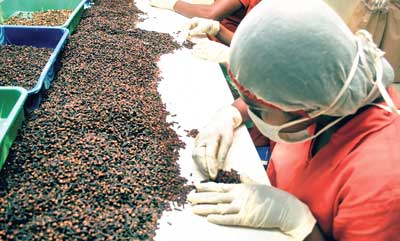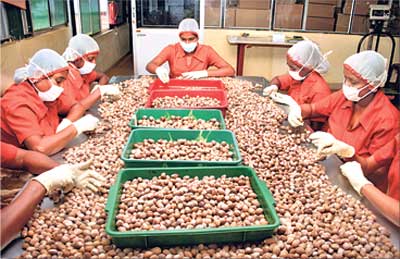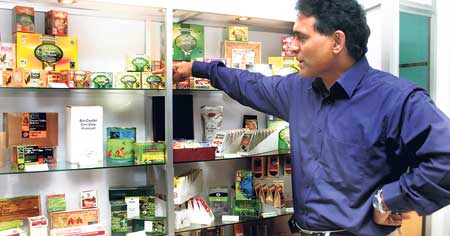
Lankan speaks to the world on small farmers
Kandy - Dr Sarath Ranaweera is not only brimming with ideas but also has an ingenious mind. In 1994 - just after he gingerly stepped into the unexplored territory of organic food - the home-grown scientist was attending a small farmer workshop in Germany when he had an idea. "You normally have coffee breaks in Europe; not tea breaks. I managed to convince the coordinator that when it was time for a break to announce that participants would be having a tea break. Participants were surprised and sounded bored. I quickly went into the kitchen at the centre where the meeting was taking place and prepared a special cup of tea, properly brewed, for all. Doubtful at first, their faces lit up on drinking it and they instantly asked "Hey this is an amazing cup of tea. How did you do it?" Samaraweera smiled as he passed a cup of black tea at his office in Kandy and told us to keep it brewing for seven minutes. "This is my best quality black tea," the former Tea Research Institute (TRI) scientist said, laughing out loud as he recalled how he secured a client. "A German buyer then gave me a contract." That was more than 10 years ago. Today Ranaweera's Bio Foods (Pvt) Ltd is probably Sri Lanka's biggest exporter of organic food with value added products in tea, spices, curry powder, among others - all produced in the hills of Kandy and Matale. But the Peradeniya graduate who worked at the Industrial Development Board and the TRI for many years before deciding to be an entrepreneur and his own boss, is not resting on his laurels. This low profile organic food manufacturer says he has much to offer the country; unfortunately no one is listening. "I am in all kinds of state advisory committees providing my free time and travelling down to Colombo for these meetings which are all a waste of time. There is nothing constructive that comes out. It’s just talk, talk and talk," he lamented.
But someone did listen at the weekend – and that's an international organisation. A weekend meeting between a group of organic farmers that Ranaweera nurtured in Kandy and an international team of Fair Trade experts convinced the latter that this simple work could be used as a fair trade model in other parts of the world. "SOFA (Small Organic Farmer Associations) is a great model that we could use to replicate in the rest of the world," Christophe Alliot, Deputy Director of France's Max Havelaar, the French member of Fairtrade Labelling Organisation (FLO), told The Sunday Times FT after a field visit on Tuesday. Agreed Ranaweera, founder and creator of SOFA; "What we have created is the most sustainable model of fair trade and organic food in the world." Fair Trade is an international trading partnership helping disadvantaged producers, farmers and farmer' societies to get better prices for their products whilst ensuring quality and environmentally friendly products. FLO is the leading standard setting and certification organization for Fairtrade labels. Alliot and two of colleagues from FLO partners in New Zealand and the UK were in Sri Lanka attending a 2-day meeting of NAP (Network of Asian Producers), a grouping formed two years ago under the FLO umbrella to provide a voice for Asian producers. During the Sri Lankan visit, the 3-member FLO team decided to visit Ranaweera's project in the hills and were astounded with the model. "This is quite amazing how these farmers have combined bio diversity and organic food production," said Alliot, speaking in the backdrop of efforts by FLO to look for a sustainable model that would convince some doubtful consumers that producers were actually benefiting from the premium price.
Ranaweera says he has a formula to end rice and other agriculture subsidies --- gradually, not in one go - and improve the life of the farmer. "We need to perfect a scheme where rice farmers have a guaranteed price (just like the SOFA model) and then they have enough to pay back loans and something to save," he said, adding with a smile: "No one would listen to a maverick like myself anyway." On the other hand, the scientist is an acknowledged expert in fair trade and travels across the world speaking to consumers and convincing them that producers, like in the Sri Lankan case, are indeed benefiting from FLO. He now hardly has time for his own business - as he speaks to the world on behalf of small farmers. Not surprising that he's an unsung hero in his own country. "Fairtrade wants to use our model as the organisation is under attack in the rest of the world. I am constantly asked to speak to consumers on how fair trade has benefit farmers based on our experience. Consumers, at these international gatherings, ask us to show proof that the money (premium) is actually going to producers," said Ranaweera, who has degrees in food science & technology, and agriculture in addition to experience as an international consultant in tea processing and research. He said FLO was planning to send a team to work with a group of undergraduates from the University of Peradeniya in Kandy to formulate a workable model based on the SOFA initiative. W.R. Punchibanda, 64, is a typical hill farmer who grows tea, coffee and spices on his sloping 2.5 acre land and hardly earned anything until SOFA came along. "In around 1980 I would pluck some tea leaf from the garden and sell it to the local shop for just 25 cents per kilo to buy bread or some food. In a month, we would get about 50-60 rupees from tea," he said seated in his simple brick house surrounded by a rich assortment of shrub jungle, food trees and vegetation – and leeches on rainy days. But when Ranaweera emerged and sold the concept of SOFA to farmers in Kandy and adjoining districts in 1998, Punchibanda - now the president of a SOFA affiliate - saw his tea earnings rise to 50 rupees per kilo and 2,000-2,500 rupees per month. "That's not all; SOFA has done a lot of welfare (from the Fairtrade premium) looking after members and their families and taking care of the community." "This has changed our lives for the better." Ranaweera has argued against the Fairtrade concept of producers also being marketers where they are expected to get the best price and shut out the trader. "Our model has proved that producers shouldn't spend time selling and marketing as long as they are guaranteed a price and assured of markets." SOFA, with more than 2,000 farmers and some 30,000 dependants in the production chain, is the first ever Fairtrade association of spice producers and touted as the most sustainable farmers' organisation. It gets the Fairtrade premium direct to its coffers. Tea for example receives a premium of 1 Euro per kilo in the price tag if sold in Europe and this money goes straight to the producer. "Our model is simple and sustainable. Our company takes care of the marketing and quality certification while the producer (farmer) gets a minimum guaranteed price set by SOFA. The farmer needs not worry about marketing or quality certification; he has his buyer and assured price," said Ranaweera. Bio Foods spends millions of rupees every year on quality certification for Fairtrade labels (carried on every pack) and other requirements which the farmer otherwise has to spend this under the usual Fairtrade concept. Agrees Alliot: "Small farmers involved in organic food production don't have resources to prove it by certification which is costly. We try to help them by reducing the certification fees (to qualify for Fairtrade labelling) or partly fund them." But he concedes that this may not be a sustainable model and that's one of the reasons why Ranaweera's model has grabbed FLO's attention as it tackles consumers concerns of producers getting their rightful dues. Ranaweera, who created the SOFA model and is constantly helping farmers to improve their price, quality and standards, and ensure what he calls a living wage, believes empowering farmers at the village level is the future for countries like Sri Lanka. "There is no use of urban development if village communities are not empowered. The fruits of development must start from the village and move upwards rather than the trickle-down (top-to-bottom) approach," the Sri Lankan scientist who wants to dedicate himself to helping small farmers and village communities, noted. The SOFA model is also being considered in other parts of Sri Lanka. Rangit Gunasekera, Chairman of FLO's Sri Lanka Consultative Body, describes Ranaweera as an amazing personality. "He has spoken and practised fair trade much before anyone else in the world. He started his campaign in 1993 and the SOFA model is now unmatchable." Sri Lanka was the first Asian producer to embrace fair trade many years ago and has the highest number of Fairtrade members (21) in Asia, after India with 57 members while Thailand is in third place with 13 members. SOFA members pay a subscription of 10 rupees per month to upkeep the organisation and this revenue plus the per kilo premium it gets from Fairtrade labelling, helps to develop the farmers and their community. |
|
||
| || Front
Page | News
| Editorial
| Columns
| Sports
| Plus
| Financial
Times | International
| Mirror
| TV
Times | Funday Times || |
| |
Reproduction of articles permitted when used without any alterations to contents and the source. |
© Copyright
2007 | Wijeya
Newspapers Ltd.Colombo. Sri Lanka. All Rights Reserved. |


